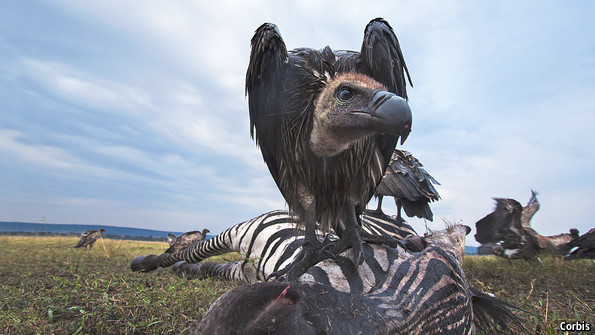
VULTURES are not exactly picky eaters. The carcasses on which they dine swiftly decompose, broken down by micro-organisms that excrete a range of nasty toxins. This makes decaying flesh a perilous source of food for most animals. Vultures, by contrast, either wait until their chosen corpse has decayed enough for them to peck through its often tough skin, or find a quicker way in via natural orifices. They frequently choose the fast-food route, inserting their head deep into the anus of large decomposing animals and exposing themselves to a mass of faeces-borne pathogens. Far from haute cuisine, then.
Just how far is described by the first-ever genomic analysis of the micro-organisms found on and in the facial skin and large intestine of vultures, published this week in Nature Communications. Warning: this is not lunchtime reading.
Among an average of 528 types of bacterium found on the heads of 50 turkey and black vultures were those that can cause botulism, gangrene, tetanus, septicaemia, blood clots and metastatic abscesses in other animals. And although these birds did not have it, another study found Bacillus anthracis in vulture faeces. It causes anthrax, except in vultures.
Vultures clearly have strong stomachs, in every sense. With an acidity at least ten times that of a human's, a vulture's gut destroys a large amount of any potentially pathogenic bacteria that is ingested. Indeed, when the researchers analysed the contents of each bird's large intestine, they could not detect some 85% of the micro-organisms they had found on its facial skin.
But what remains is hardly benign. The microbial flora in a vulture's large intestine is dominated by two types of anaerobic faecal bacteria, Clostridia and Fusobacteria, both of which can be deadly to other animals. Some Clostridia species have been responsible for periodic mass die-offs in birds such as ducks, geese and waders (although other species can be beneficial), while Fusobacteria nucleatum is associated with human colon cancer.
So how do vultures survive-and even thrive-in what the researchers delicately refer to as their 'challenging dietary niche'? Lars Hestbjerg Hansen of Aarhus University in Denmark, who led the international team, notes that zoo vultures, which eat very different diets, have a similar microbial composition in their intestines. This, he says, suggests that 'the partnership between bird and bacteria is profound and well-established.'
In other words, a mutually beneficial relationship appears to have evolved. The vulture's fiery gut does have a few allies. One study found that vultures have naturally occurring antibodies against certain species of Clostridium, including Clostridium botulinum, the bacterium responsible for botulism. Vultures also have other peculiarities in their fortified immune systems, including some nerve endings that are apparently able to resist neurotoxins.
All this enables vultures to filter out bacteria that are least effective at breaking down its festering food while tolerating those that help, however dangerous. These include Clostridia, which grows speedily in the gut and produces vital nutrients by degrading the most complex foods. Fusobacteria are similarly adept at extracting nutrients. In return, the bacteria find themselves in an anaerobic environment where they receive a steady flow of protein-rich food that enables them to thrive. Dr Hansen and his colleagues are already pecking away at the genetics to confirm all of this.
Vultures, meanwhile, may have been getting a bad rap. They have been associated with the spread of anthrax and other diseases through their faeces, which is clearly possible. But by picking carcasses clean they may also be making the transmission of such diseases more difficult. Hungry animals may be tempted to take a bacteria-laden bite out of any carcass littering the landscape, becoming both victim of and vector for whatever they have contracted. They may be less likely to make a snack out of vulture poo.
Entities 0 Name: Fusobacteria Count: 2 1 Name: turkey Count: 1 2 Name: Aarhus University Count: 1 3 Name: Lars Hestbjerg Hansen Count: 1 4 Name: Dr Hansen Count: 1 5 Name: Denmark Count: 1 Related 0 Url: http://www.cbc.ca/news/technology/vultures-use-acid-nasty-bacteria-to-digest-rotting-flesh-1.2849921 Title: Vultures use acid, nasty bacteria to digest rotting flesh Description: They snack on danger and dine on death, merrily munching on rotting flesh that would certainly sicken or kill any person and most other animals. But how do vultures do it? These feathery scavengers have one of the toughest guts on the planet, that is how.
Tidak ada komentar:
Posting Komentar